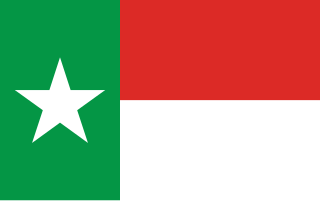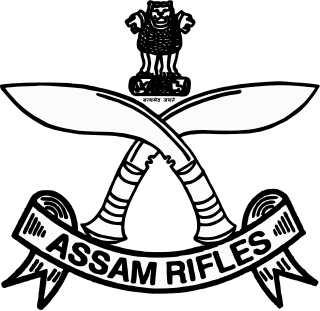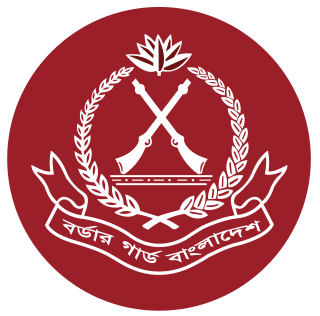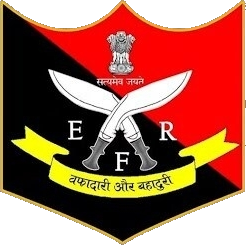
The Border Security Force (BSF) is a central armed police force in India under the Ministry of Home Affairs. It is responsible for guarding India’s borders with Pakistan and Bangladesh. It was formed in the wake of the Indo-Pakistani War of 1965 to ensure the security of India’s borders and for related matters. All officers and subordinate staff are trained at the BSF Academy in Tekanpur near Gwalior in Madhya Pradesh.

The Central Reserve Police Force (CRPF) is a central armed police force in India under the Ministry of Home Affairs. The CRPF's primary role lies in assisting the States and Union Territories to maintain law and order and provide Internal security. It is composed of Central Reserve Police Force (Regular) and Central Reserve Police Force (Auxiliary).

The Indo-Tibetan Border Police (ITBP) is a central armed police force in India under the Ministry of Home Affairs. It is responsible for guarding India’s border with Tibet. It was formed in the aftermath of the Sino-Indian War of 1962.

The National Liberation Front of Tripura was a banned Christian Tripuri nationalist militant organisation based in Tripura, India. It had an estimated 550 to 850 members.

The Assam Rifles (AR) is a Paramilitary force responsible for border security, counter-insurgency, and maintaining law and order in Northeast India and in Jammu & Kashmir in lines of Rashtriya Rifles. Its primary duty involves guarding the Indo-Myanmar border. The AR is one of the Oldest Central Para-military Forces of India administered by the Ministry of Home Affairs while operational control rests with Indian Army. As a central police force, its recruitment, perks, promotions, and retirement policies are governed by Assam Rifles Regulations. Approximately 80 percent of the officers are deputed from the Army, while the remaining are drawn from the AR cadre. The AR is commanded by the Director General of the Assam Rifles, appointed by the Ministry of Home Affairs.

Law enforcement in India is imperative to keep justice and order in the nation. Indian law is enforced by a number of agencies. Unlike many federal nations, the constitution of India delegates the maintenance of law and order primarily to the states and territories.
Armed Forces Act (AFSPA), 1958 is an act of the Parliament of India that grants special powers to the Indian Armed Forces to maintain public order in "disturbed areas". According to the Disturbed Areas Act, 1976 once declared 'disturbed', the area has to maintain status quo for a minimum of 3 months. One such act passed on 11 September 1958 was applicable to the Naga Hills, then part of Assam. In the following decades it spread, one by one, to the other Seven Sister States in India's northeast. Another one passed in 1983 and applicable to Punjab and Chandigarh was withdrawn in 1997, roughly 14 years after it came to force. An act passed in 1990 was applied to Jammu and Kashmir and has been in force since.

The Insurgency in Northeast India involves multiple separatist and jihadist militant groups operating in some of India's northeastern states, which are connected to the rest of India by the Siliguri Corridor, a strip of land as narrow as 14.29 miles (23.00 km) wide.

The Border Guard Bangladesh (BGB) is a paramilitary force responsible for the border security of Bangladesh. The BGB is entrusted with the responsibility to defend the 4,427 kilometres (2,751 mi) border of Bangladesh with India and Myanmar. It was formerly known as the Bangladesh Rifles (BDR).
The Home Guard of India is a volunteer force tasked to be an auxiliary to the Indian Police Service (IPS). The Home Guards Organisation was reorganised in India in 1966 after the Sino-Indian War with the People's Republic of China, though it existed in smaller units individually in some places. Home Guards are recruited from various cross sections of the civil society such as professionals, college students, agricultural and industrial workers etc. who give their spare time for betterment of the community. All citizens of India, in the age group of 18–50, are eligible. Normal tenure of membership in Home Guards is three to five years.

The Eastern Frontier Rifles (EFR) are a State Armed Police Force for the Indian state of West Bengal. They are a part of the West Bengal Police, as opposed to the Kolkata jurisdiction. The Border Guards Bangladesh are descended from the portion of the Eastern Frontier Rifles given to Pakistan during the partitioning of 1947.

The All Tripura Tiger Force (ATTF) was a Tripuri nationalist militant group active in India's Tripura State. It was founded on 11 July 1990, by a group of former Tripura National Volunteer members under the leadership of Ranjit Debbarma. The ATTF is considered a terrorist organisation by India. According to the South Asian Terrorism Portal, approximately 90% of the ATTF's administration are Hindu and the rest are Christians. The group was said to have been formed as the armed wing of the National Liberation Front of Tripura (NLFT) but split into its own organization. The group was headquartered in Tarabon in Bangladesh.

Sashastra Seema Bal is a central armed police force in India under the Ministry of Home Affairs. It is responsible for guarding India’s borders with Nepal and Bhutan.
Tripuri Nationalism is an ideology that supports self-determination by the Tripuri people. The conflict is in essence ethnic and the Tripuri community, indigenous to the region formed the clear majority of population in the princely state of Tippera, which joined the Republic of India in 1949 as the state of Tripura.

The Mizo National Front uprising was a revolt against the government of India aimed at establishing a sovereign nation state for the Mizo people, which started on 28 February 1966. On 1 March 1966, the Mizo National Front (MNF) made a declaration of independence, after launching coordinated attacks on the Government offices and security forces post in different parts of the Mizo district in Assam. The government retaliated and recaptured all the places seized by the MNF by 25 March 1966.

The Assam Police is the law enforcement agency for the state of Assam in India. A regular police force was initiated in Assam by the British after the Treaty of Yandaboo to maintain the law and order. It functions under the Department of Home Affairs, Assam. The headquarters of Assam Police is situated at Ulubari in the state capital Guwahati.

In India, the Central Armed Police Forces (CAPF) is the collective designation for the central police organizations under the Ministry of Home Affairs. Since 2011, the term "central armed police forces" has been adopted, replacing the term "paramilitary." The CAPF is responsible for internal security and border protection. Each force within the CAPF is led by a Director General (DG), typically an officer from the Indian Police Service (IPS), with the exception of the Assam Rifles, which is headed by a Lieutenant General-ranked officer from the Indian Army.
The State Armed Police Forces of India are the police units established for dealing with serious law and order situations requiring a higher level of armed expertise than normal. The State Armed Police Forces exist in addition to the ordinary police services of the various states.

The insurgency in Tripura was an armed conflict which took place in the state of Tripura between India and several separatist rebel organisations. It was a part of the wider insurgency in Northeast India and was fueled by Tripuris.
In India, the police forces of the states and union territories are responsible for law enforcement in the states and union territories. Police and Public Order are State subjects under the Seventh Schedule to the Constitution of India.















